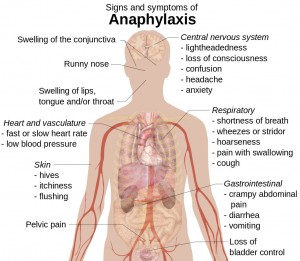The symptoms of anaphylaxis usually appear rapidly after exposure to the allergen. This can be as soon as a few minutes after a bee sting.
 Initially the symptoms may be the same as in a mild allergic reaction, i.e. skin rash, runny nose etc – but this is not always the case. Another early reaction in some cases is described as a “feeling of impending doom”.
Initially the symptoms may be the same as in a mild allergic reaction, i.e. skin rash, runny nose etc – but this is not always the case. Another early reaction in some cases is described as a “feeling of impending doom”.
As the anaphylactic reaction develops the person is likely to show symptoms affecting various body systems. The skin is most commonly affected with around 90% of people experiencing hives or feeling flushed and hot.
Respiratory symptoms occur in approximately 70% of people and along with cardiovascular symptoms (25%) present the greatest danger to the person. If an anaphylactic reaction does prove fatal it is usually due to either shock, where the blood pressure drops massively, or asphyxiation due to swelling of the throat.
Anaphylaxis Signs & Symptoms
- Difficult or noisy breathing
- Wheezing, tight chest or asthmatic response
- Hoarse voice
- Tightness / swelling of throat and / or tongue
- Rapidly spreading rash / hives
- Flushing or hot feeling skin
- Sudden drop in blood pressure (shock) resulting in dizziness / fainting
- Rapid or irregular heartbeat
- Feeling of “impending doom”
- Stomach cramps, nausea and vomiting
Any or all of these symptoms may be present. However, it is essential that action is taken quickly and all anaphylactic episodes require emergency medical treatment even if recovery appears complete. A potential risk is biphasic anaphylaxis in which symptoms reappear some time after the patient seems to have fully recovered.
Of course if a person has previously experienced anaphylaxis this is a good indicator. The reaction to the allergen will present in the same way as on previous occasions.
Other risk factors that may help identify an anaphylactic reaction are a general predisposition to other allergic conditions such as asthma, eczema, or allergic rhinitis.